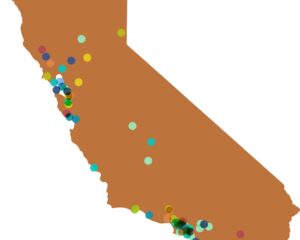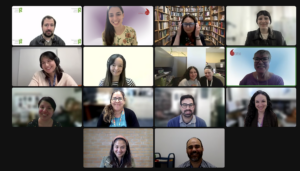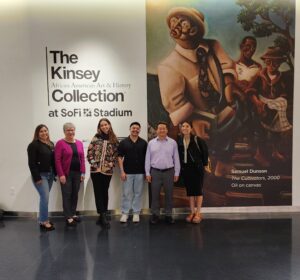“My father opens a map of California—
Traces mountain ranges, rivers, county borders
Like family bloodlines. Tuolomne,
Salinas, Los Angeles, Paso Robles,
Ventura, Santa Barbara, Saticoy,
Tehachapi. Places he was happy,
or where tragedy greeted him
like an old unpleasant relative.”
— Excerpt from Deborah A. Miranda’s Indian Cartography
November 1 marks both the start of #NativeAmericanHeritageMonth as well as #NationalAuthorsDay, and so we decided to highlight a few contemporary Native American authors from California.
We’re including both authors who descend from a native tribe (whether federally recognized or not) that is within the State of California, as well as authors whose native ancestry comes from outside the state but live and write here.
The list isn’t definitive; we want to hear from you! Add your favorite Native Californian authors in the comments below. Here’s who’s on ours:
Dina Gilio-Whitaker
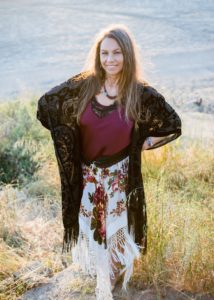
In 2016, the Standing Rock protest put a national spotlight on Indigenous activists, but it also “underscored how little Americans know about the longtime historical tensions between Native peoples and the mainstream environmental movement.” This April, indigenous researcher and activist Dina Gilio-Whitaker, author of All the Real Indians Died Off, and 20 Other Myths About Native Americans, published an absorbing response; a history of “indigenous environmentalism,” As Long as Grass Grows: The Indigenous Fight for Environmental Justice. The book explores the history of treaty violations, reservation struggles for water and food rights, and the protection of sacred sites, while highlighting the longtime leadership of Indigenous women in the struggle.
Few scholars could be better positioned than Whitaker to write this book. Raised in Southern California, member of the Colville Confederated Tribes, and professor of American Indian Studies at CSU San Marcos, Whittaker has recently been promoted to Policy Director at Center for World Indigenous Studies. With policy on her mind, Whitaker ensured that As Long as Grass Grows provided new approaches to environmental justice activism and policy.
To learn more about Dina Gilio-Whitaker’s work (and surfing!), follow her blog Ruminative.
Deborah A. Miranda
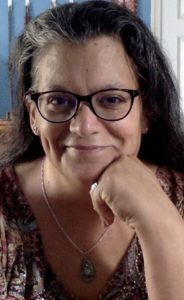
© Deborah A. Miranda.
Writer and poet Deborah A. Miranda is an enrolled member of the Ohlone-Costanoan Esselen Nation of in Monterey County, California, and is also of Chumash ancestry. A prolific writer, her work has been published in anthologies and journals since the mid-1990s. Born in Los Angeles, she was raised in Washington state and teaches English at Washington & Lee University in Lexington, Virginia. Probably most well-known for Bad Indians: A Tribal Memoir, an unflinching recollection of violence survived, in her childhood, in her family’s tree, and in the broader California Indian community as a result of the Mission system. She’s also known for several works of poetry, including her books Indian Cartography: Poems, The Zen of La Llorona, nominated for a Lambda Literary Award, and Raised by Humans. Her work often focuses around themes of race and ethnicity, gender, sexuality, ancestry, heritage, and the natural world.
She’s an editor of Sovereign Erotics: An Anthology of Two-Spirit Literature along with Qwo-Li Driskill, Daniel Heath Justice, and Lisa Tatonetti. As a queer-identified writer descended from the Native Americans who were removed from land and forced to work in the Spanish Mission system, her work “interrogates the identity of California Indians” and what this history means for her heritage today. She’s advocated for changes to California’s statewide curriculum on the Missions to this effect.
To learn more about Deborah A. Miranda, check out her blog or follower her at @badndns on Twitter.
Tommy Orange
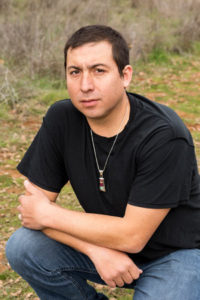
Born and raised in Oakland, California, Tommy Orange has had an incredible year. His 2018 debut novel, There, There, has topped must-read lists across the country, was a New York Times Best Seller, and Orange was named a Pulitzer Prize finalist, among many other accolades. The story follows the history of the US through the stories of twelve urban Native Americans who travel to Oakland for a Powwow and deal with the aftermath of a violent event taking place there. An enrolled member of the Cheyenne and Arapaho Tribes of Oklahoma, Orange recently graduated from the MFA program at the Institute of American Indian Arts in Santa Fe.
The reference in the title, to Gertrude Stein’s description of her hometown of Oakland, is echoed in Orange’s work, where he describes urban areas for Indians as “buried ancestral land, glass and concrete and wire and steel, unreturnable covered memory. There is no there there.” In an interview with BuzzFeed, he said, “I avoided a lot of rez Indian writing, because it made me feel isolated—and like it was the only way to Indian write.” There, There is being celebrated for bringing to a wide audience perspectives that is not often at the center of the story—that of urban American Indians.
Orange has been hailed by multiple critics as a member of the burgeoning “Native American Renaissance” among writers, despite having said he “often didn’t feel Native American enough.” Of mixed heritage—his father spoke Cheyenne as his first language and was a Native American Church ceremony leader, while his white mother, who worked for the Office of Indian Education, converted to Evangelical Christianity—Orange speaks about his biracial ancestry and the liminal place that urban Native Americans occupy in the national imagination about what Indian life, and writing, is like.
For more on Tommy Orange, visit his author page on the Penguin Random House website, or follow him @thommyorange on Twitter.
Tommy Pico
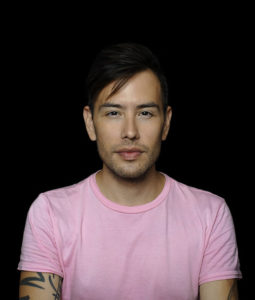
A critically-acclaimed queer indigenous writer, poet, and podcast host, Tommy Pico grew up on the Viejas Indian reservation of the Kumeyaay nation where his father was a chairman. After graduating from Sarah Lawrence College, he went on to publish his first book of poetry, IRL, an epic written as a long text message, which received the Brooklyn Public Library Literary Prize. His second book, Nature Poem, won an American Book Award and was a finalist for a Lambda Literary Award. Also using the epic format, in Nature Poem, Pico he explores and challenges stereotypes of Native Americans as “noble savages” who are one with nature. His latest book, Junk, is a finalist for the 2019 Lambda Literary Award, and his forthcoming Feed will be published by Tin House Books.
Pico lives bicoastally between Los Angeles and Brooklyn. He co-curates a reading series Poets with Attitude, with fellow poet Morgan Parker. He is also a host on two podcasts: Food 4 Thot, which references literature and popular culture along with frank conversations about queer identity, race, sex, and relationships; and Scream, Queen! which explores the roles of queer people and people of color in horror films. He’s also a contributing editor at the Literary Hub, and has been profiled in the Paris Review, Time Out New York, the New York Times, and the New Yorker.
For more on Tommy Pico, visit his website, tommy-pico.com or follow him on Twitter @heyteebs.
David Treuer
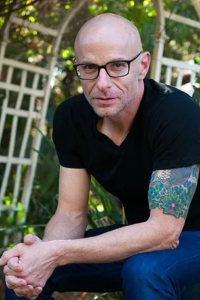
The best-selling writer, critic, and academic David Treuer is a Professor of Literature at the University of Southern California, teaching in the PhD Creative Writing & Literature program. Treuer’s mother, an Ojibwe nurse who later became a tribal court judge, met his father, an Austrian Jewish survivor of the Holocaust, when he was teaching high school on the Leech Lake Reservation in Minnesota, where he was raised.
As of 2019, he’s published seven books, including three works of fiction: Little, The Hiawatha, and The Translation of Dr Apelles. In 2006 he published Native American Fiction: A User’s Manual, a collection of critical essays which was noted in many “best of the year” lists. In it, he remarked that the work of many Native American writers often relies on nostalgia and stereotypes, being read as ethnography rather than fiction. He stated in it, somewhat controversially, “Native American fiction does not exist.” His fourth work combined memoir as well as journalism in Rez Life: An Indian’s Journey Through Reservation Life. Following Rez Life, he published two more novels,Prudence and The Heartbeat of Wounded Knee, described as “ A sweeping history—and counter-narrative—of Native American life from the Wounded Knee massacre to the present,” for which he was a National Book Award finalist.
Treuer has also been known for his work with his brother Anton on Ojibwe language preservation. He has been an NEH Fellow, a Guggenheim Fellow, as well as a recipient of the Pushcart Prize. Treuer has published stories and essays in Esquire, TriQuarterly, The Washington Post, the Los Angeles Times, the New York Times, Lucky Peach, and Slate.com.
For more about David Treuer, visit his website, davidtreuer.net or follow him on Twitter: @DavidTreuer.


